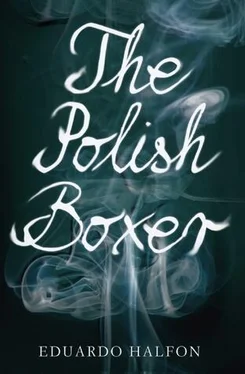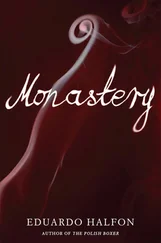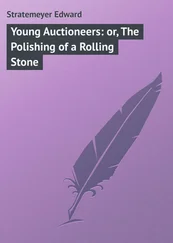Eduardo Halfon - The Polish Boxer
Здесь есть возможность читать онлайн «Eduardo Halfon - The Polish Boxer» весь текст электронной книги совершенно бесплатно (целиком полную версию без сокращений). В некоторых случаях можно слушать аудио, скачать через торрент в формате fb2 и присутствует краткое содержание. Год выпуска: 2012, Издательство: Bellevue Literary Press, Жанр: Современная проза, на английском языке. Описание произведения, (предисловие) а так же отзывы посетителей доступны на портале библиотеки ЛибКат.
- Название:The Polish Boxer
- Автор:
- Издательство:Bellevue Literary Press
- Жанр:
- Год:2012
- ISBN:нет данных
- Рейтинг книги:4 / 5. Голосов: 1
-
Избранное:Добавить в избранное
- Отзывы:
-
Ваша оценка:
- 80
- 1
- 2
- 3
- 4
- 5
The Polish Boxer: краткое содержание, описание и аннотация
Предлагаем к чтению аннотацию, описание, краткое содержание или предисловие (зависит от того, что написал сам автор книги «The Polish Boxer»). Если вы не нашли необходимую информацию о книге — напишите в комментариях, мы постараемся отыскать её.
marks the debut of a major new Latin American voice in English.
The Polish Boxer — читать онлайн бесплатно полную книгу (весь текст) целиком
Ниже представлен текст книги, разбитый по страницам. Система сохранения места последней прочитанной страницы, позволяет с удобством читать онлайн бесплатно книгу «The Polish Boxer», без необходимости каждый раз заново искать на чём Вы остановились. Поставьте закладку, и сможете в любой момент перейти на страницу, на которой закончили чтение.
Интервал:
Закладка:
A black doll hung disconcertingly on the front door. Please, sit. Juan will be back very soon, his mother told me. The house looked clean and comfortable, in spite of everything. In one open area were the kitchen, a small table-cum-dining room, and a rustic black leatherette sofa. Candles cast a hazy light in one corner. I went over to look at a shelf with framed photos of the children at their First Communion, not realizing I’d been toying with a cigarette until Juan’s mother brought in an ashtray. You can smoke, she said, placing it on the table. I thanked her and sat down, but I decided to slip it back into the pack. Without asking, she brought me a cup of plantain atol and then sat down beside me. I’d never tried plantain atol before. I asked her how it was made. She didn’t reply. Do you know, Señor Halfon, why Juan left his studies? I said that I did not, that at the university they wouldn’t say anything other than for personal reasons. That’s what we requested, she said, looking down, but in an exaggerated way, as if her eyes would bore through the floor and into the ground. She remained like that until the door opened abruptly and Juan appeared in the doorway, holding hands with a girl of perhaps six or seven. He wore a too-small white shirt, with a too-small black vest over it. The girl looked like a miniature version of her mother: dressed in black, with a white mantilla on her head. I turned and saw that in the corner, around the candles, were wilted flowers and a rosary and some old photographs, and all of a sudden everything made sense.
For lunch we had turkey — which we call chompipe and they called chunto — and sweetened crookneck squash. Then, as we walked together to the central square, Juan told me that his father had been sick for many years, that he had had prostate cancer and eventually it spread all over. He said that his father had refused to go to the capital to have a doctor look at it, that he preferred to keep working. My father died in the field, he said, and that was all he said. There was nothing else to say, I suppose. But the image of his father dying in an orchard, on land he tended that was not his, stayed with me.
Juan treated me to a cup of coffee. The best in Tecpán, he boasted, paying a woman who had her little table set out right in the center of the square. She poured a squirt of coffee extract, a little hot water, and a little milk into two plastic cups. When she said something in Cakchikel, Juan just smiled. In silence, we walked toward an empty bench.
This is yours, I said, handing him the notebook and the poem he’d mailed me. I thought he’d try to refuse them, but he took them with no comment whatsoever. A barefoot woman passed by, selling cashews. I’ve read your books, Halfon, Juan said, looking over at a group of men shining shoes beside the fountain. And then for a time, neither of us said anything. I wanted to tell him that it made perfect sense to me why he’d dropped out, that he didn’t have to explain it. I wanted to tell him how much I missed him in class. I wanted to tell him to keep writing poetry. But there was no need for that. Someone like Juan Kalel could never abandon poetry, even if he wanted to, mostly because poetry would never abandon him. It wasn’t a question of form, or aesthetics, but of something much more absolute, something much more perfect that had little or nothing to do with perfection.
A girl came up and said hello to Juan and the two of them began speaking in Cakchikel. It sounded beautiful, like drops of rain falling on a lake, perhaps. When she left, I asked Juan if he also wrote poems in Cakchikel. He said of course. I asked how he decided whether to write them in Spanish or Cakchikel. He was quiet for a time, looking out at the fountain where the shoe-shine boys gathered. I don’t know, he said finally. I’ve never thought about it before. Then we fell back into that natural silence we had, as if neither of us really needed to say anything or as if everything between us had already been said, either way. The air smelled of roasted corn on the cob. In the distance, a boy was selling baby chicks, and people were ignoring a preacher. Do you know, Halfon, how to say poetry in Cakchikel? Juan asked suddenly. And I said no, I had no idea. Pach’un tzij, he said. Pach’un tzij, I repeated. And I savored the word for a time, taking pleasure in it purely for its sound, for the delectable lure of its pronunciation. Pach’un tzij, I said once more. Do you know what it means? he asked, and although I hesitated, I said no, but that it didn’t really matter. Braid of words, he said. It’s a neologism that means braid of words, he said. Pach’un tzij, he intoned, giving it an elegance that could only be gained through unskeptical spirituality. It’s something like an embroidered blouse of words, like a huipil of words, he said, and that was all.
It had gotten late. The sun was starting to go down and we decided to walk back to Juan’s house. Near the colonial church, an old man stood before a small white cage. We approached. He had a yellow canary in it and was whispering or singing softly to it. Juan told me that the canary was a fortune-teller, and I smiled. No, really, he said. How much? I asked the old man. He raised two fingers. I took two coins from my pocket and handed them to him. But it’s for him, I said, pointing to Juan: I’d rather know his future than mine. The old man took a wheel full of colored slips of paper and then whistled softly to the canary, placing the wheel in front of the bird. With its beak, the bird pecked out a pink slip of paper. Then the old man took it, whispered something to the bird, folded the paper in half, and handed it to Juan, who was staring fixedly at the canary. There was no tenderness in his stare, no compassion. Instead, he looked angry, almost violent, almost furious, as if the canary were divulging some dark secret. Juan unfolded the pink paper and read it in silence. I simply watched, also silent, and maybe it was the streetlight, or maybe it was something else, but I could see the purple scar clearly on his right cheek, which now looked like much more than a blow from a machete. And then very slowly, as if emerging from a nightmare, Juan began to smile. I thought of asking him what the paper said, asking him what future the canary had predicted for him, but I decided against it. Some smiles are not meant to be understood. Juan said something to the old man in Cakchikel, slipped the pink paper into his shirt pocket, and looking up at the sky said it would be getting dark soon.
Twaining
I arrived in Durham wanting to vomit. The passenger next to me, a huge black guy with the friendliest southern accent possible, had been talking to me throughout the three-hour flight about the furniture business in North Carolina, while the plane heaved and shook like a damn spinning top. Try sucking on an ice cube, he suggested when he saw me turning pale, or green, or both. That always helps. I closed my eyes for the last stretch of the journey, and when we finally landed and I dared to open them again, the big black guy was fanning me worriedly with one of the inflight magazines. Nice people, southerners.
I’d studied engineering in the same area, just twenty minutes from Durham, but I hadn’t been back for twelve years. Why would I? That prim nostalgia that Americans drum up for their alma mater has always seemed really pathetic to me. I walked out of the airport and the November chill made me feel better, or at least not so dizzy. I wandered between taxis and suitcases. Because of the tinted glass, it took me a while to make out my last name in the window of a plush limousine — well, not exactly a limousine, but a Cadillac or a Lincoln, which as far as I was concerned came to pretty much the same thing. I asked the driver if I had time to smoke a cigarette and he said of course, that we were still waiting for a passenger from Utah. I sat down on a bench. He stayed on his feet. I offered him a Camel, but he looked serious and shook his head. We talked about the weather, though it’s possible that I’m wrong and that’s just how I remember it. He was surprised to learn that I came from Guatemala and more surprised when I told him I’d been born there and still lived there. But your English is excellent, he remarked, and I said thanks very much, yours too. He just exhaled an enormous cloud of cold air.
Читать дальшеИнтервал:
Закладка:
Похожие книги на «The Polish Boxer»
Представляем Вашему вниманию похожие книги на «The Polish Boxer» списком для выбора. Мы отобрали схожую по названию и смыслу литературу в надежде предоставить читателям больше вариантов отыскать новые, интересные, ещё непрочитанные произведения.
Обсуждение, отзывы о книге «The Polish Boxer» и просто собственные мнения читателей. Оставьте ваши комментарии, напишите, что Вы думаете о произведении, его смысле или главных героях. Укажите что конкретно понравилось, а что нет, и почему Вы так считаете.












